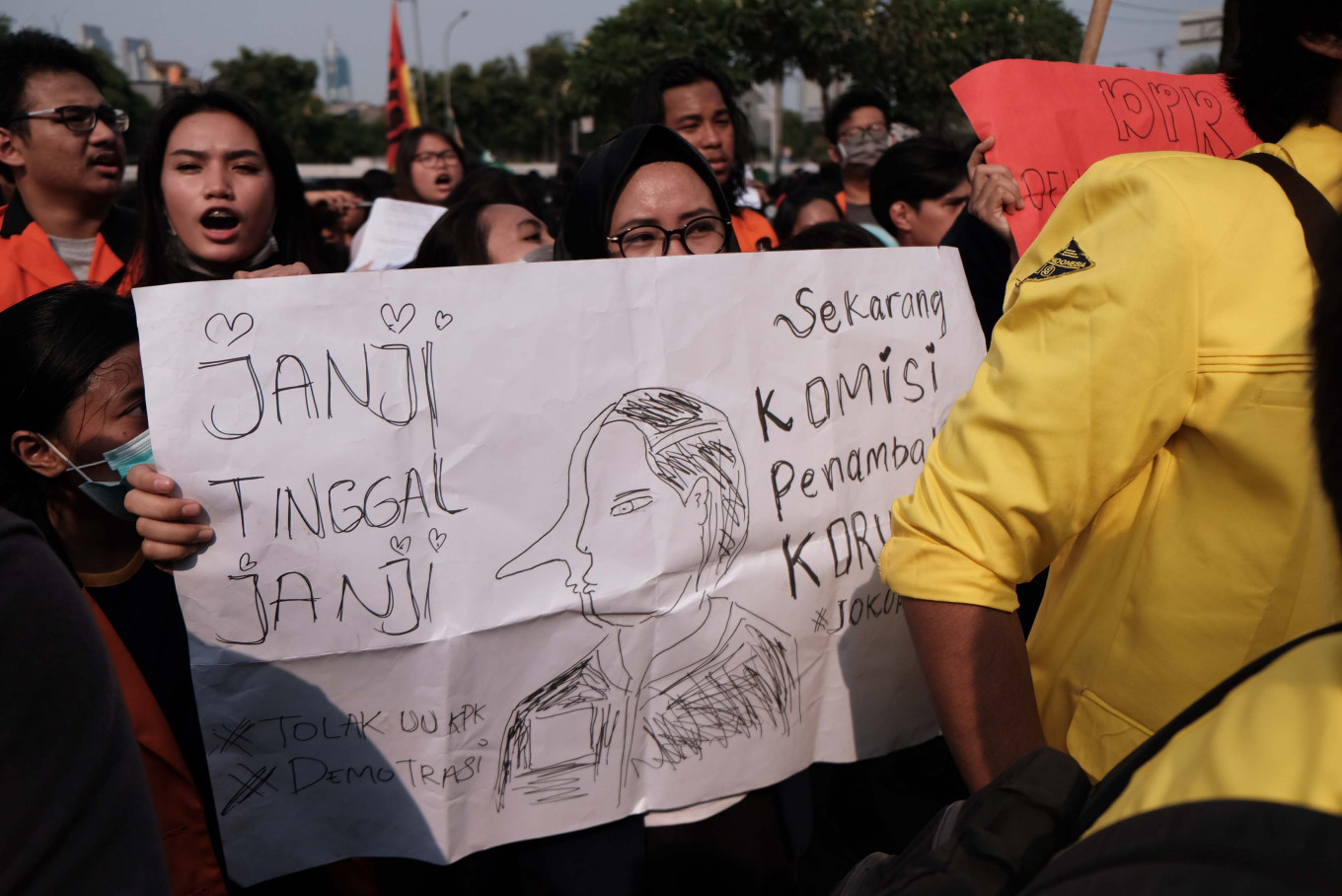Popular Reads
Top Results
Can't find what you're looking for?
View all search resultsPopular Reads
Top Results
Can't find what you're looking for?
View all search resultsDon’t rush KUHP deliberation: Jokowi
Change text size
Gift Premium Articles
to Anyone
P
resident Joko "Jokowi" Widodo has ordered the Law and Human Rights Ministry to delay the deliberation of the revision to the Criminal Code amid concerns over its illiberal provisions.
"I will tell the Law and Human Rights Ministry not to rush the process. They need to hear more aspirations from the public," Jokowi said in a meeting with media leaders on Wednesday.
Jokowi was responding to a question regarding what civil society groups deemed as a rushed process in the amendment of the colonial-era Criminal Code.
The ministry had just last week submitted the latest version of the draft bill to the House Commission III overseeing legal affairs and human rights, claiming that it had watered down a set of provisions widely deemed as draconian. But critics said they had been left largely intact.
Lawmakers are currently in a month-long recess and have yet to discuss the draft bill. The Commission III previously had been planning to hear opinions from each House faction regarding the changes proposed by the government in the next sitting session starting in mid-August.
Commission III deputy chairman Adies Kadir from the Golkar Party said on Thursday that he had yet to hear such information about Jokowi's instruction. But he promised that lawmakers would hear the voices of the public.
"We want to be prudent in discussing the bill and hearing public opinions, particularly regarding 14 crucial topics. We need to adjust it [colonial-era penal code] to the current situation. This bill is too important for the development of our criminal justice system," he said. "We want everyone, from law practitioners, religious and indigenous leaders to academicians, to give input to Commission III."
Adies was referring to 14 much-debated topics that were at the heart of student demonstrations that forced a delay in the passing of the bill some three years ago.
Deputy Law and Human Rights Minister Edward "Eddy" OS Hiariej previously told lawmakers that the government had received feedback from a series of public consultations last year before making the changes in the latest draft bill. But Adies said on Thursday that lawmakers found that “there are still many members of the public who remain unaware of the details of the draft bill”.
"So, what the President says, if true, is consistent with the position of the Commission III – that we don't want to rush the deliberation without hearing public aspirations," Adies said.
The latest changes to the bill still include some contentious provisions, from criminalizing insults to the president to fornication and cohabitation, although the government claimed it had softened the provisions.
Activists and experts say this could still curb civil liberties. They previously also accused the government of keeping the draft bill from the public eye.
Some other lawmakers contacted by The Jakarta Post either declined to comment or said they have yet to hear about Jokowi's remarks.
In late 2019, Jokowi called on lawmakers to hold off the bill deliberation following a public backlash and a few days later the House agreed to delay the passing of the bill. At the time, students, activists and the public deemed the bill went too far into the private lives of citizens and curtailed freedom of expression and the right to privacy.
Sitting lawmakers have enough time, until mid-2024, if they intend to pass the bill during their tenure, Adies said.
“I'd say two years is more than enough [time] for policymakers – and the public – to discuss the bill together so we have our own penal code that has Indonesian characteristics,” he said.
This is in contrast to what Deputy Minister Eddy previously suggested — that policymakers would seek to conclude the deliberation at least by the end of this year.
Previously, lawmakers from several House factions in Commission III had signaled that they might want to conclude the deliberation as soon as possible.
Habiburokhman from Gerindra Party, for instance, said last week that the deliberation of the bill had taken too long. He suggested that opponents of the bill could challenge the bill at the Constitutional Court instead after being passed.
Johan Budi from the ruling Indonesian Democratic Party of Struggle (PDI-P), meanwhile, stressed earlier this week the urgency of the bill to be passed, while he also acknowledged the need to accommodate public opinion in the process.










